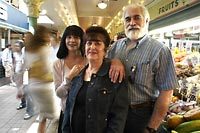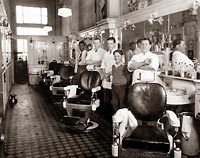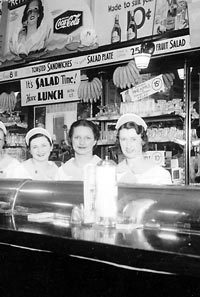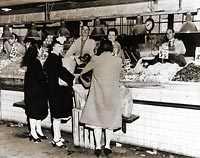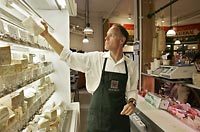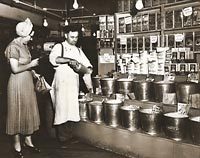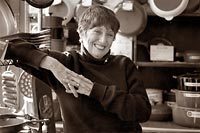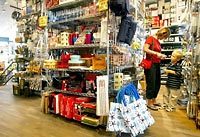 |
|
|
|
|
|
|
Friday, March 19, 2010 - Page updated at 02:50 PM Pike Place Market pioneers: "It was our life"Seattle Times restaurant critic
Violette Benezra Bienn rounds the corner at First and Pike, past DeLaurenti Specialty Food & Wine, peers into Bottega Italiana and sees something more than a tiny café selling gelato and espresso: She sees her childhood. In the 1930s, this First Avenue café was a barbershop owned by her father, Leon Benezra, a Turkish immigrant who supported a wife and seven children back when a shave and a haircut really did cost two bits. Today Bienn is a feisty octogenarian who marvels at the changes she's seen in Seattle — and 100-year-old Pike Place Market — since growing up in the Central Area among a tight-knit community of Sephardic Jews. "They all came from the old country and they didn't have a lot," she says. "We didn't even have an icebox. But, the way they cooked! Everything was fresh." What they did have was a great sense of community, one that extended beyond their neighborhood to Pike Place Market, where they worked — and shopped. Violette Bienn has been shaped by the Market, as have others whose lives have intersected here. They have grown older and wiser with this place, all the while honoring its evolution. Bienn recalls how her father eventually closed his barbershop and went into business with his brother Harry, running a produce stall in the heart of the Market. Their brother Jack sold cheeses nearby. And when family strife got in the way of family business, the Market's landlord made Leon Benezra an offer he didn't refuse: the chance to buy his own stall. Leon balked at the cost — $400 — but Violette's mom, Pearl, said, "Take it!" "My father was a clean-shaven barber, he wasn't the [Market] type," Violette recalls. "She was aggressive." Pearl quickly became a Market maven. She would rise early and head to Western Avenue in a rickety old truck to barter with the farmers who supplied them. Her sons lent a hand, transporting and stacking produce before taking the streetcar back to school. On Saturdays, young "Vi" would take that same streetcar downtown to see a movie, stopping at the Market to get money from her mother — and to score a bunch of carrots to munch while watching Ginger Rogers and Fred Astaire. Waiting for a ride home, she and her sisters would walk up and down the main arcade, waving to the Levys and Amons who owned the fish stalls; greeting Mr. Rousso, who was always quick to offer a piece of fresh fruit; and stopping to see Mr. Mossafer, "who wore a big apron, smoked a cigar and always said, 'Hello, girls!' " "We loved it," says Bienn, whose family ran the produce stand until 1948. "It was our life." DeLaurenti's: "a family operation" It was also the life of the DeLaurentis, whose name has been synonymous with Mediterranean munificence in Seattle since 1946. That's when Pete and Mae DeLaurenti opened Pete's Italian Grocery, in a lower-level Market shop once run by Mae's mother. "I started working there when I was 11 years old," says Louie DeLaurenti, now 71, who stocked shelves and sold Italian meats and cheeses with his younger brother Marty after school. "We stayed till we closed, then went home together as a family." Summertime was a different story. "In the summer, you never wanted to work for your parents," he says. Instead, the DeLaurenti boys worked the farm stalls. "There were 100 or so in the Market then — Italians, Filipinos, Japanese, from South Park, Kent and Auburn." Schooled in the fine art of salesmanship, Louie took that knowledge to Leed's, the national shoe chain where he worked for 17 years, rising from salesman to manager while raising two daughters with his wife, Pat. Meantime, passionate politics had surrounded a plan to demolish the Market and develop the land. By 1973, when the Public Development Authority (PDA) was created to preserve the Market, Pete DeLaurenti was 65 and wanted to retire, Louie says. "He was too old to reinvest money into the business, and decided he'd rather sell it." Louie decided to buy the store, and he promptly moved it to larger, more visible quarters at First and Pike. The newly christened DeLaurenti's became Pike Place Market's unofficial front door, and Louie its unofficial mayor. Here, three generations of his family — including his wife, and daughters Kandi and Vicki, helped out. "It was quite a family operation," says the man who ran it as such until 2001, when a trio of young suitors came to call. A landmark changes hands Pat McCarthy, his brother-in-law Pat McDonald and their friend Matt Galvin knew a thing or three about investing by the time they approached Louie DeLaurenti about selling his business. They'd made money investing in Torrefazione Italia (a specialty coffee company started by McDonald's father), bought Seattle's beloved Pagliacci Pizza and were looking to expand their food-focused efforts elsewhere. "I was just 65," recalls Louie. "I decided I'd never [again] have the opportunity they were offering. They were qualified buyers; my children didn't want to take over the business. I'm a little sorry about that, but I understand, too. My son-in-laws had their own occupations." Louie also felt a connection to his buyers. His great-uncle, years earlier, had sold what would become Gai's Bakery to Henry Gai, Pat McDonald's grandfather. Deal struck, DeLaurenti Specialty Food & Wine opened under new ownership. "The place became a landmark under Louie's leadership," McCarthy says, noting that, in 2001, the landmark was in a state of deferred maintenance. "I called Lou up and said, 'Louie, how do I turn the heat on?' He said, 'You put on a sweater!' " In 2003 DeLaurenti closed briefly for an expansive — and expensive — remodel. Aisles were widened, floors replaced. New deli and display cases showcased ingredients available on the menu in an expanded café, relocated from its upstairs nook. Café sales quintupled. Louie, from the vantage point of retirement, says, "I was a different type of merchant. I liked things bursting at the seams. When I grew up, it was the higher you can stack it, the better it looked. "It's very nicely organized now. Everyone has their different approach. ... It looks great, they're happy with it." McCarthy says the investment will help preserve DeLaurenti as a community service, not just a business. "We've got to be here, because if we're not, it changes the city." Sur La Table started small Shirley Collins has watched the city, the Market, and the scope of her business change dramatically since she opened Sur La Table in 1972. As one of the early preservationists whose "Friends of the Market" initiative helped save the Market from the wrecking ball, she recalls the days when she and her confreres sat at Lowell's Market café and "plotted the overthrow of the urban-renewal plan." Efforts won, the gourmet cook, former executive secretary and budding entrepreneur — "tired of going to San Francisco every time I needed a pastry bag" — put her money where our mouths were. Armed with a $12,000 bank loan and a crowbar, she leased a 750-square-foot rat-trap on Stewart Street — the first PDA-approved application in the new Pike Place Market Historic District — and began turning a "vacant wreck, full of stolen goods" into one of the nation's premiere cookware shops. Surveying the site and the Market in 1972, her real-estate attorney suggested, "Get yourself a big dog." As one of the New Market pioneers, Collins says "there was nothing south of Stewart Street except a very scuzzy tavern, a seed company" and, in its original location, another new venture, Starbucks, where she'd buy coffee to keep warm that first cold winter. "I remember sitting by myself in the shop, in a snowstorm, never seeing a person all day." Then she spotted a man, bracing against the wind. "He sprinted across the street, came in and bought something. I was so grateful — grateful to see another human!" Seattle's grateful cooks soon turned Collins' shop into a moneymaking mecca. She shared recipes, offered advice and professional discounts, and sold everything from cookbooks and whisks of all sizes to the latest French imports. But it was a newfangled appliance, she says, that "catapulted us onto the national scene": the Cuisinart. "I thought I'd never sell them, and then I sold one a day — at about $140 each — for the next six months." After Gourmet magazine wrote about the food processor, noting Sur La Table as a source, "People would drive down from Canada in Rolls-Royces and buy two or three for their friends." With business booming, she recalls, "I was in the right place, at the right time, with the right thing." It wasn't long before her funky, fantastical shop outgrew its cramped space. And when Collins learned that the vintage building across the street was slated for demolition, she stepped in with another bright idea. "I went to the PDA and said, 'I'd like to develop that building.' The head of the PDA laughed at me! I was furious." Putting that fury to work, she found business partners and financing, successfully tapped the federal government for additional funding, "and I got the damn building." In 1980, Sur La Table moved to its present location, a stunning Market showcase with a full kitchen, perfect for demonstrating new products and hosting culinary luminaries like Julia Child. Shirley Collins had become a Market treasure and Sur La Table Seattle's ultimate foodie destination. Over the years, the warm and fuzzy shop morphed into a national enterprise, growing from 15 employees to 120 — with offices, a warehouse and middle managers supporting an expansive catalog business. But, "The cost of that was just enormous," she says. "It was just murdering us." In 1995, wracked with loans and bills, the woman who helped save the Market saved her beloved business by selling Sur La Table — and its debt — to Seattle's Behnke family. Along with a group of investors, the Behnkes have grown the company into a nationwide chain with more than 55 stores, 1,300 employees and a distribution of 9 million catalogs. Old-timers still come around A dozen years later, Collins finds solace on her farm on Whidbey Island. She raises chickens and gathers eggs there, but her "golden egg," she says, is the building she developed — and still owns — in Pike Place Market. Ever the Market advocate, she sits on the board of directors of Friends of the Market, shops for flowers from Market vendors and imported cheeses at DeLaurenti. On Saturday mornings she might run into Louie DeLaurenti, who meets his old cronies for coffee at Le Panier bakery each week. Vi Bienn's Market ties also remain strong. Her son, Leon, is a refrigerator repairman who tends the ailing iceboxes at Market restaurants. Her daughter, Marcia, owns the special-events facility Top of the Market, a former turn-of-the-century dance hall. Not long ago, Marcia brought her mother to the Market to visit the shop where granddaughter Alexa was working. Vi looked into the café where her granddaughter scooped gelato and said, " 'My father had a barbershop here,' " Marcia recalls. "She practically started crying." Strolling the Market's main arcade on a recent day, Vi passed her parents' old produce stand — still in operation — and Pure Food Fish, where she spied her old neighbor, fishmonger Sol Amon. "Remember me?" she asked him. "Vi? How could I forget you?" he smiled. "I've known you for 70 years." Nancy Leson: 206-464-8838 or taste@seattletimes.com Copyright © 2007 The Seattle Times Company Most read articles
|
Seattle Times Special
Miracle Machines: The 21st-Century Snake Oil
The Favor Factory
Confronting Malaria
Pike Place Market
Your Courts, Their Secrets
License to Harm
The Bering Sea
Olympic Sculpture Park |


